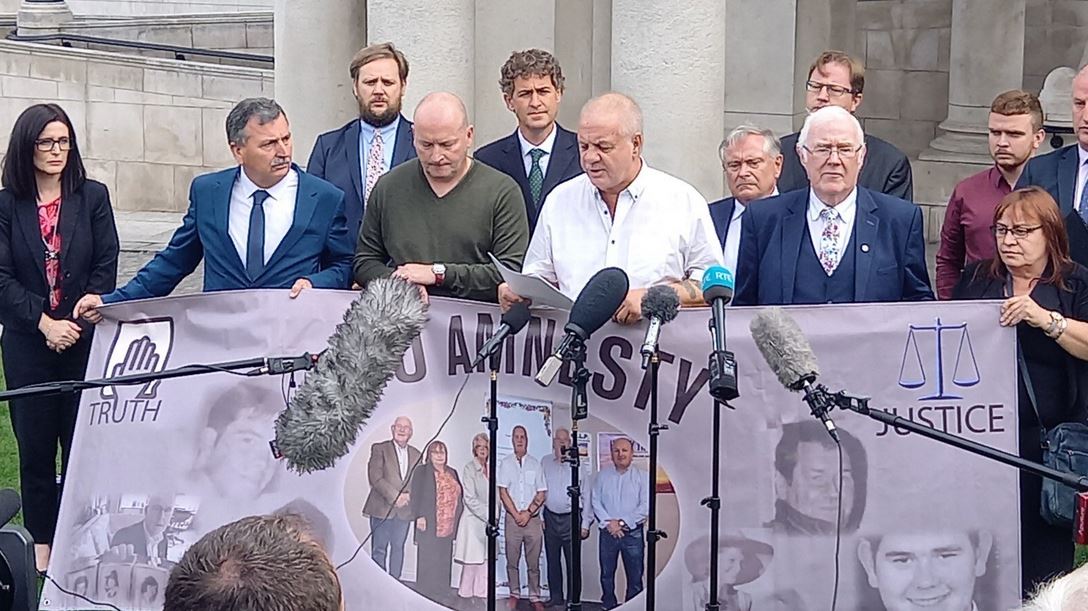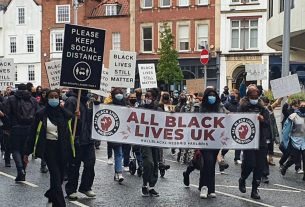Members of all major political parties on the island of Ireland have united to oppose Boris Johnson’s plans to “draw a line under the Troubles” by ending all prosecutions related to the conflict in Northern Ireland.
Victims groups joined politicians from all sides to sign a document rejecting the UK government’s plans for a statue of limitations – including an amnesty for those accused of murder – unveiled by the Northern Ireland secretary Brandon Lewis in July.
Families of victims of the violence hailed Monday’s (August 30) meeting as a “historic day” with a delegation of Irish parliamentarians, comprising TDs (MPs) and senators joining with members of Sinn Fein, the DUP, Alliance and SDLP to register their opposition to the government’s plans.
The new legislation will end all legacy inquests into killings related to the conflict in Northern Ireland, as well as all civil actions. The prime minister Boris Johnson previously said the ban will “draw a line under the Troubles and enable the people of Northern Ireland to move forward”.
‘It is obscene’
However, the proposed amnesty – for paramilitaries and members of the military and security forces – has been called “obscene” by Julie Hambleton, founder of Justice for the 21, a campaign group who are battling “to get to the truth behind” the 1974 Birmingham pub bombings, carried out by the IRA.
“We stand as a voice for those who are not here,” said Hambleton, outside Belfast City Hall on Monday.
Hambleton’s sister was killed in the bombings, along with 20 others, and she continued: “It is obscene. There is no justification, no moral or ethical justification for any government, particularly in Westernised society, to try and implement such a piece of law.
“They are looking to introduce and whitewash centuries of legislation and reintroduce new laws that will allow mass murderers to continue to have their liberty and come to any of our cities and kill with impunity without any any fear of retribution.”
Hambleton added: “They are setting a precedent that will make us the laughing stock of the world.”
‘As important as the Good Friday Agreement’
Raymond McCord, whose son was murdered by Loyalist paramilitaries, said the document – signed in Belfast and Dublin on Monday – is as important as the Good Friday Agreement.
He added: “The British Government has no choice now. Every major political party in Ireland now support this, they can’t ignore that. The victims’ groups in England is supporting us as well. People in the UK and Ireland support this. Boris Johnson is taking on all of the people now.
“It’s not an orange or green issue, or unionist or nationalist, it is the victims.
“I want to see Dublin parties and the Taoiseach [Micheál Martin] on board, I want to see the EU on board and the Americans come on board.”
‘It dances on the graves of our loved ones who were murdered’
Billy McManus, whose father was one of five killed by a loyalist attack on a Belfast bookmakers in 1992, said there will be a demonstration outside Downing Street next month.
He added the government’s proposals make a “mockery” of the deaths of more than 3,000 people, and added: “It dances on the graves of our loved ones who were murdered.”
While some former soldiers have criticised the proposed legislation, a group representing 200,000 British army veterans who served in Northern Ireland, gave their full support to the plan to end all investigations and prosecutions relating to the Troubles.
The Northern Ireland Veterans Movement (NIVM) said in July the proposals will “offer a way forward for those who served”, and will fulfil “promises made by the government” in their 2019 election manifesto to protect veterans from prosecutions.
Almost 90% of Loyalists oppose Good Friday Agreement, survey finds
Meanwhile a poll of more than 1,000 loyalists in Northern Ireland has found 88% no longer support the 1998 Good Friday/Belfast Agreement, according to the Belfast Telegraph.
The “engagement survey”, comprising 19 questions relating to the Northern Ireland “protocol, policing and politics”, and conducted by the Let’s Talk Loyalism group also found 93% of loyalist respondents believe republicans get better treatment from the police.
Newspaper columnist Alex Kane pointed out that “almost 90% of the respondents were male”, and added: “That seems huge considering the male/female balance in NI.”




